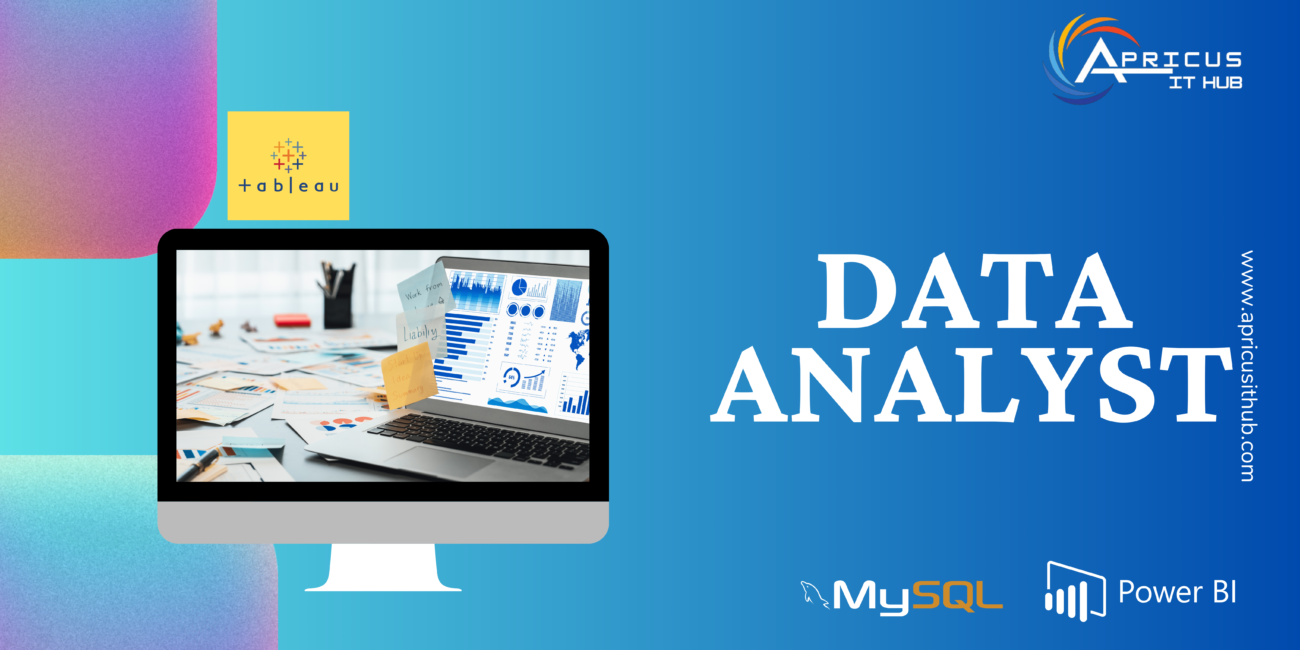Data Analyst
Courses Details
Data Analyst
-
1st Installment – 20000
-
2nd Installment – 15000
-
3rd Installment – 15000
-
Duration – 4 Months
-
Mode : Online/ Offline
-
* DISCOUNT MAY BE APPLICABLE

Do you have a Technical Issues?

Data Analyst – Power BI + Tableau + SQL
A data analyst is someone who examines large sets of data to identify trends, develop charts, and create visual presentations to help businesses make informed decisions. They use various statistical and analytical techniques to interpret data and extract valuable insights that can drive strategic initiatives and improve organizational performance. In essence, they bridge the gap between raw data and actionable insights, helping businesses understand their operations, customers, and market dynamics better
Lorem Ipsum is simply free text not dummy available typesetting industry been the industry standard Lorem ipsum is simply free text
- SQL (Structured Query Language):
- SQL is used to retrieve, manipulate, and analyze data stored in databases.
- Data analysts write SQL queries to extract specific datasets, perform calculations, filter data, and join multiple tables.
- SQL is essential for data cleaning, transformation, and preparation tasks before analysis.
- Power BI:
- Power BI is a Microsoft tool for data visualization and analytics.
- Data analysts use Power BI to create interactive dashboards, reports, and visualizations.
- Power BI connects to various data sources, transforms raw data into insights, and enables data-driven decision-making.
- Tableau:
- Tableau is a leading data visualization and analytics platform.
- Data analysts leverage Tableau's advanced visualization capabilities to create interactive dashboards and visualizations.
- Tableau connects to diverse data sources, facilitates data exploration, and helps identify trends and patterns in the data.
Our Benefits
- Improved Decision Making: By analyzing data and providing actionable insights, data analysts help organizations make informed decisions that can drive business growth and efficiency.
- Enhanced Operational Efficiency: Data analysts identify inefficiencies and areas for improvement, enabling businesses to streamline operations and reduce costs.
- Increased Revenue: Through trend analysis and forecasting, data analysts help businesses identify opportunities for revenue growth and market expansion.
- Risk Management: Data analysts assess risks and predict potential issues, helping businesses to mitigate risks and avoid costly mistakes.
- Continuous Improvement: Data analysts embrace a data-driven approach, constantly seeking feedback and refining their analyses based on new data and evolving business needs, leading to ongoing enhancement of business strategies over time.
FAQs on Data Analysts
What skills are required to become a data analyst?
Skills required for data analysts include proficiency in statistical analysis, data manipulation, and visualization tools such as Python, R, SQL, Excel, Tableau, or Power BI. Strong analytical, problem-solving, and communication skills are also essential for interpreting and presenting data effectively.
What is the difference between a data analyst and a data scientist?
While both data analysts and data scientists work with data, there are differences in their roles and responsibilities. Data analysts focus on analyzing existing data to provide insights and support decision-making, often using descriptive and diagnostic analytics techniques. Data scientists, on the other hand, leverage advanced statistical and machine learning techniques to predict future outcomes and drive strategic decision-making
What career progression opportunities are available for data analysts?
Data analysts can advance their careers by gaining expertise in specialized areas such as data visualization, predictive analytics, or machine learning. They may also pursue advanced degrees or certifications to move into roles such as data scientist, data engineer, or analytics manager.
What kind of jobs are there after completing the data analyst courses?
After completing data analyst courses, you can pursue roles such as Data Analyst, Business Analyst, Data Scientist, Data Engineer, Quantitative Analyst, Market Research Analyst, Healthcare Analyst, Operations Analyst, Financial Analyst, or Risk Analyst.
How do I gain experience as a data analyst?
To gain experience as a data analyst, you can participate in internships, freelance projects, or volunteer opportunities that involve working with data. Additionally, leveraging online platforms like Kaggle or participating in data analysis competitions can provide practical experience and help build your portfolio.
